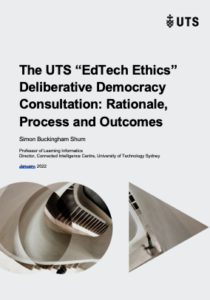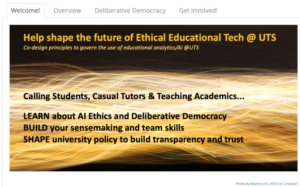We need ways to bring students and educators into informed, extended deliberation about the ethics of EdTech powered by Learning Analytics and Artificial Intelligence. CIC adopted a novel community consultation process using the principles and methods of Deliberative Democracy to consult with the UTS community…
What principles should govern UTS’ use of analytics and artificial intelligence to improve teaching and learning for all, while minimising the possibility of harmful outcomes?
This was the challenge we set a team of 20 people – students, casual tutors and full-time academics. And 5 intensive workshops later, they had delivered their response! A draft set of ethical principles to govern the use of these fast-changing technologies in UTS. How did we manage this?
Deliberative Democracy (DD) is a movement in response to the crisis in confidence in how typical democratic systems engage citizens in decision making. DD works by creating a Deliberative Mini-Public (DMP). DMPs can be convened at different scales (organisation; community; region; nation) and can take many forms.
 A DMP of 20 was selected through stratified sampling from UTS students, casual tutors and full-time academics, who engaged in a series of five workshops over seven weeks, (online, due to Covid-19 conditions). With little to no prior knowledge among most members, they learned about the topic, worked well together, and converged on a set of principles that they felt reflected their shared values. The University experts who were involved in the workshops recognised the quality of the progress made in such a brief period. UTS now has a plausibly representative expression of the community’s values, interests and concerns, in response to the brief. A detailed report, together with the principles, are on the EdTech Ethics website.
A DMP of 20 was selected through stratified sampling from UTS students, casual tutors and full-time academics, who engaged in a series of five workshops over seven weeks, (online, due to Covid-19 conditions). With little to no prior knowledge among most members, they learned about the topic, worked well together, and converged on a set of principles that they felt reflected their shared values. The University experts who were involved in the workshops recognised the quality of the progress made in such a brief period. UTS now has a plausibly representative expression of the community’s values, interests and concerns, in response to the brief. A detailed report, together with the principles, are on the EdTech Ethics website.
The raison d’etre for the initiative is to build trust within the University that these technologies are being deployed responsibly. The DMP process delivered on its promise to build engagement and trust across diverse stakeholders, and it is reasonable to conclude that this would not be the case if an expert team had drafted and announced the set of principles to the University community. The recording of the final briefing (18mins) is available, and conveys the passion and commitment that the DMP invested in the process and outcome.
There is no doubt this process could be refined and improved (a focus of our evaluation research), iterating towards principles that are both rigorous and complete, as well as trusted, and informing practices that are accountable. The current draft is a great starting point for us, because the process had the necessary integrity to move the conversation forward with the University’s leadership.
- Update March 2024: a peer reviewed article documenting the process and outcomes has now been published:
Swist, T., Buckingham Shum, S. & Gulson, K. N. (2024). Co-producing AIED Ethics Under Lockdown: An Empirical Study of Deliberative Democracy in Action. International Journal of Artificial Intelligence in Education Published online: 27 Feb. 2024. https://doi.org/10.1007/s40593-023-00380-z
